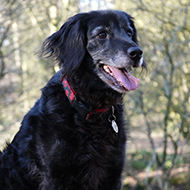
New tool will enable early detection of age-related health problems
PetSavers has provided a Citizen Science research grant to fund a new project which aims to improve communication between veterinary professionals and dog owners, and guide on best practice discussions in consultations with senior dogs.
The project- entitled ‘Using citizen science to develop a canine ageing and wellbeing tool for use in veterinary practice’- has been developed by Dr Carri Westgarth, a lecturer in human-animal interaction at the University of Liverpool.
Commenting on her receipt of the grant, Dr Westgarth says: “We are extremely grateful to PetSavers for making this project a reality…We hope that the toolkit will improve discussions between owners and veterinary professionals about senior dog care. Increasing owner understanding and involvement will enable the early detection of health problems, resulting in significant improvements in the quality of life of senior pets and the dog-owner relationship.”
“Dogs are living up to twice as long as they did 40 years ago and there are implications for senior dogs’ healthcare and well-being…Many dog owners may not be aware of the signs of serious age-related diseases as they attribute them to normal age-related changes.”
A range of interviews and surveys will be carried out with veterinary professionals and dog owners as a part of the Citizen Science project. Pet owners will be invited to share their experiences, opinions and understanding of ageing in dogs, through submitting diaries, photos or videos of their life with an older dog. The study will also examine health records of senior dogs reported in the Small Animal Veterinary Surveillance Network (SAVSNET).
The findings will help to determine what preventative healthcare and treatment advice is currently offered for senior dogs in UK veterinary practices, and will also aid in the development of the PetSavers canine ageing and wellbeing tool, which will improve knowledge-sharing between veterinary professionals and pet owners, strengthening collaboration between the two in providing the best care to older dogs.
Image (c) Dr Carri Westgarth



 The latest
The latest